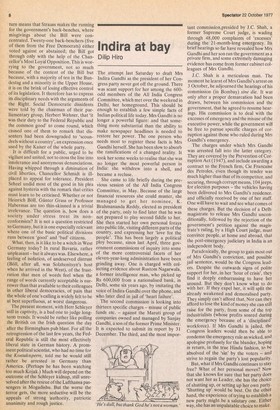Indira at bay
Di lip Niro
The attempt last Saturday to draft Mrs Indira Gandhi as the president of her Congress party never got off the ground. There was scant support for her among the 600odd members of the All India Congress Committee, which met over the weekend in Delhi, her homeground. This should be enough to establish a few simple facts of Indian political life today. Mrs Gandhi is no longer a powerful figure: and that something more substantial than the ability to make newspaper headlines is needed to restore her power. The one person who needs most to register these facts is Mrs Gandhi herself. She has been slow to absorb the ramifications of a changed reality. It took her some weeks to realise that she was no longer the most powerful person in India: she withdrew into a shell, and became a recluse.
She came to life briefly during the previous session of the All India Congress Committee, in May. Because of the large financial resources she could muster, she managed to get her nominee, K. Brahmananda Reddy, elected as president of the party, only to find later that he was not prepared to play second fiddle to her. She then started her own personal forays into public life, visiting different parts of the country, and expressing her 'love for the people'. This has been largely a political ploy because, since last April, three government commissions of inquiry into some of the more controversial facets of her eleven-year-long administration have been grinding away. One is charged with collecting evidence about Rustom Nagarwala, a former intelligence man, who picked up Rs 600,000 from a nationalised bank, in Delhi, some six years ago, by imitating the voice of Indira Gandhi over the phone, and who later died in jail of 'heart failure'.
The second commission is looking into thirteen specific charges — misuse of public funds etc. — against the Maruti group of companies owned and managed by Sanjay Gandhi, a son of the former Prime Minister. It is expected to submit its report by 31 December. The third, and the most impor tant commission,presided by J.C. Shah, a former Supreme Court judge, is wading through 48,000 complaints of 'excesses' during the 21-month-long emergency. Its brief hearings so far have revealed how Mrs Gandhi and her son ran the government as a private firm, and some extremely damaging evidence has come from former cabinet colleagues of Mrs Gandhi.
J.C. Shah is a meticulous man. The moment he learnt of Mrs Gandhi's arrest on 3 October, he adjourned the hearings of his commission (in Bombay) sine die. It was only after a proper demarcation had been drawn, between his commission and the government, that he agreed to resume hearings. His commission is to deal with the excesses of emergency and the misuse of the executive power, while the government will be free to pursue specific charges of corruption against those who ruled during Mrs Gandhi's emergency.
The charges under which Mrs Gandhi was arrested fall into the latter category. They are covered by the Prevention of Corruption Act (1947), and include awarding a contract to the French firm, Cie Francaise des Petroles, even though its tender was much higher than that of its competitor, and securing, through corrupt means, 104 jeeps, for election purposes — the vehicles having been delivered to Mrs Gandhi's residence, and officially received by one of her staff. One will have to wait and see what comes of these charges. But the decision of a Delhi magistrate to release Mrs Gandhi unconditionally, followed by the rejection of the government's petition against the magistrate's ruling, by a High Court judge, must convince people, at home and abroad, that the post-emergency judiciary in India is an independent body.
Paradoxically, the group to gain most out of Mrs Gandhi's conviction, and possible jail sentence, would be the Congress leaders. Despite the outwards signs of polite support for her, in her 'hour of crisis', they find it deeply embarrassing to have her around. But they don't know what to do with her. If they expel her, it will split the already weakened and demoralised party. They simply can't afford that. Nor can they afford to lose the kind of money she can still raise for the party, from some of the top industrialists (whose profits soared during the emergency because of a 'disciplined' workforce). If Mrs Gandhi is jailed, the Congress leaders would then be able to condemn the emergency rule as wicked, and apologise profusely for the blunder, hoping in return, in the true Hindu fashion, to he absolved of the 'sin' by the voters — and strive to regain the party's lost popularity.
But, what if Mrs Gandhi continues to stay free? What of her personal moves? Now that she knows for sure that her party does not want her as Leader, she has the choice of shutting up, or setting up her own party. 'Shutting up', would be best. On the other hand, the experience of trying to establish a new party might be a salutary one. Either way, she has an unpalatable choice to make.


































 Previous page
Previous page